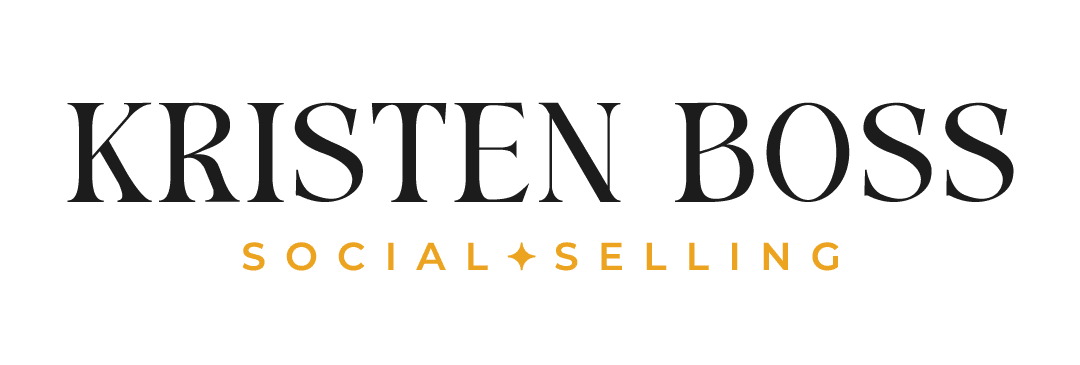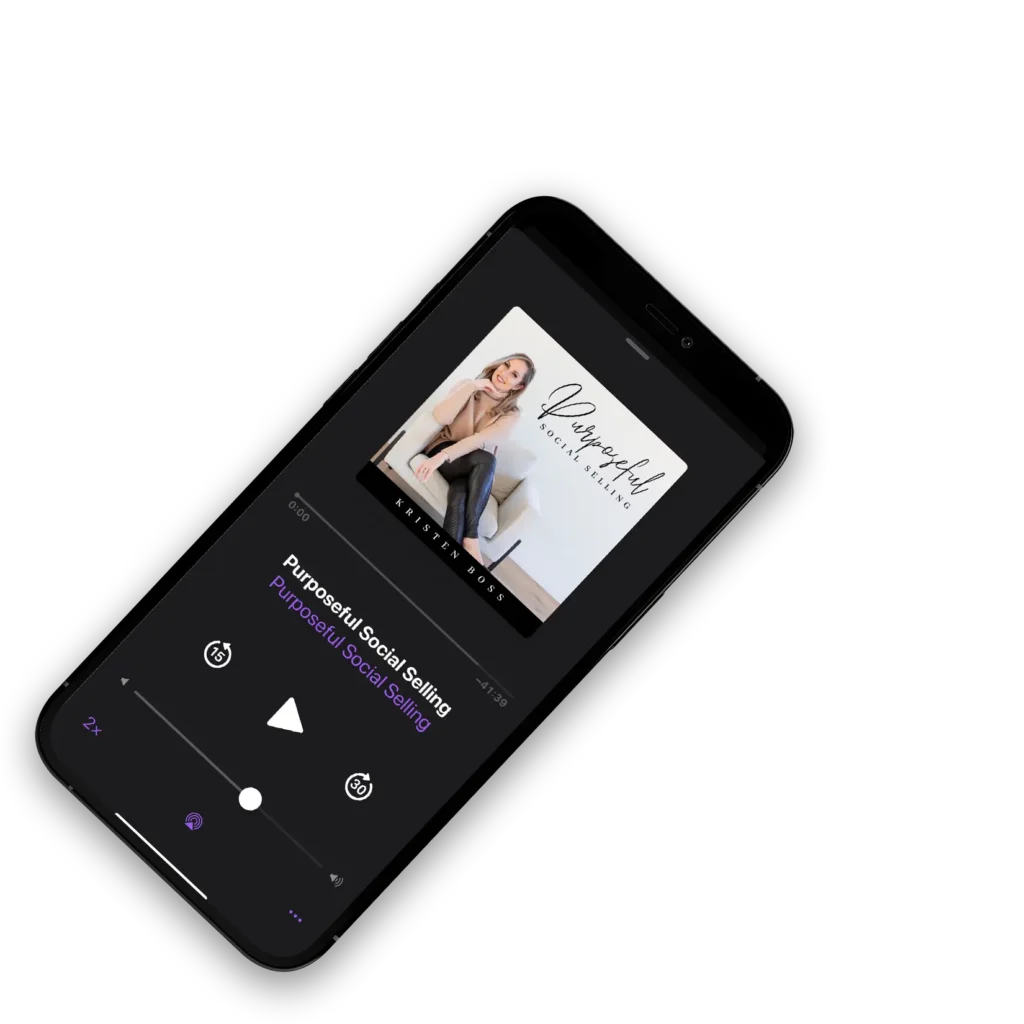In network marketing, you set goals all the time. Monthly goals, recruitment goals, sales goals, the list goes on. But what happens as the weeks pass by and you start struggling to meet those goals? The enthusiasm you had has disappeared and you’re left feeling mentally exhausted and needing a break. You don’t see the harm in taking a day off from social media, or renegotiating to a simpler goal.
This is a form of self-sabotage Kristen calls micro-quitting, and it can do more harm to your business than you think. In this week’s episode, she talks about micro-quitting and how it can be lethal to your growth.
Here’s what Kristen wants you to understand about the pitfalls of micro-quitting:
- Why you must lean into discomfort to learn the why of what you’re feeling
- How to combat the snowball effect of negative thought patterns with self-trust
- Why it’s okay to experience negative emotions
- Learning the difference between hustling and staying consistent
- The secret to recognizing what micro-quitting looks like for you
Staying consistent is a crucial part to any successful business. When you begin the cycle of micro-quitting, you’re allowing it to get in the way of your growth. Being able to recognize the signs of micro-quitting can help you to stop the cycle before it starts.
If you’re ready to learn the simple process of running your social selling business online, you have to check out Kristen’s live group coaching program! The Social Selling Academy: www.thesocialsellingacademy.com
Do you have a question about network marketing? Kristen can help! Drop your question here and she just might answer it live on the podcast: https://kristenboss.com/question
Do you have a business full of customers and almost no builders? You’re in need of a reboot! Learn the three skills you can learn that will completely change your recruitment game. Check it out here.
Interested in Kristen’s exclusive mastermind for six-figure earners in the network marketing industry? Get all the details and join the waitlist here.
Transcript for Episode #58: Micro-Quitting
Kristen Boss (00:05):
Welcome to purposeful social selling with Kristen Boss. I’m your host, Kristen Boss. I’m a mindset and business coach with more than 15 years experience in both the product and service based industry. I believe that social selling is the best business model for people wanting to make an impact while they make serious income. This is the podcast for the social seller, who is tired of feeling and authentic in their business and desires to find a more purposeful and profitable way of growing their business in today’s social media landscape. In this podcast, you will learn what it takes to grow a sustainable business through impactful and social marketing. It’s time to ditch the hustle and lead from the heart. Let me show you the new way. Hey bosses, welcome back to another episode of the podcast. So glad to have you here. So I want to kick off this podcast because this particular episode is going to be about micro quitting
Kristen Boss (01:03):
And how we all can be guilty of it from time to time and just how devastating it can be to momentum and results in your business. But before we go there, I want to shout out some amazing academy members who crushed it in June. I realized this is releasing mid July, but I still feel like it is so exciting to share. And a lot of these are newer students. Some have been for a while, but one of the biggest things you learn inside the academy and that you learn even in this podcast is the value of learning to slow down, start operating your business from a place of feeling, calm of serving and adding value and having fun. Goodness, if it’s not fun, why are we doing it seriously? It should be fun. So one of the things my students learn is to truly calm down and serve and really focus on what matters and get out of the hustle hurried end of month energy and doing everything in a frantic to try and hit numbers and sending out a bunch of messages to try and get the goal.
Kristen Boss (02:08):
And what I teach can be extremely counterintuitive. And these students all demonstrate what happens when you’re willing to slow down, get calm and get focused. So I want to share what Amber had to say. She said, I signed a new consultant under me, calmly. We had a phone call. We discussed her goals and there was zero pressure. She said to herself, I feel safe joining with you. I ended up hitting my June goal with no hustle, very calm. And I’m continuing to show up authentically and consistently. Yes, Amber.
Kristen Boss (02:38):
Amanda: She had a new rank that she’s wanted for so long. And she enrolled. Hello? 13 people got one of her new builders to a new rank as well. Amanda, well done, Sarah:She became the top recruiter in her company in June. She says this top recruiter in the, what the heck all while my butt’s been so calm, we say, calm your butt down in there a lot.
Kristen Boss (03:05):
She said, my belief has been so huge and my connections are all very real and meaningful. You just show up so differently when you aren’t invested in the outcome. And instead of just providing a solution, a service and value, it makes all the difference. Yes it does. Sarah Love it.
Kristen Boss (03:20):
Kristen had this to say she showed up consistently, even when she was sick with COVID, she signed up six new customers, including a new wellness partner that got her first customer. The day she joined and her team volume has doubled since April that’s in two months. Y’all amazing. Julianne had this to say she recruited three new people and had the best sales she’s had this year. I love it. Here’s what Amanda has to say. This one is so fun. She joined SSA the social line academy only six weeks ago. And she says this since joining SSA, after the recruit reboot training, I’ve got a ton to celebrate.
Kristen Boss (04:01):
I reflected back on my June and realized what I’ve accomplished. I had one new customer approach me to say, she’s ready for the product. I had a customer who previously declined hosting a party. Come to me, ask me for a party inquire about the business opportunity and has decided to sign up with me because of my quote, honesty and ability to connect with others. June was supposed to be my slowest month of business to date, but I didn’t allow for one day of scarcity sending messages or feeling the need to do a month and blitz just to hit my goal. Oh, and I still hit the goal even while being on vacation at the beginning of the month and almost no cell service. She said she was able to show up clearly for her teammates. She held space for them to get in touch with their goals and offer full support.
Kristen Boss (04:44):
She learned and practice writing copy for her Instagram, which has led to the most engagement and results on her insights, which happened to skyrocket a slower than usual weekend. While celebrating with some girlfriends, she says, hashtag slow down to speed up. Truly works. One last one.
Kristen Boss (05:02):
This is Erica. She said on the last day of the month, I was calm. I refuse to send out a bunch of DMS trying to get my sales up. I made sure my team knew where their gaps were and help my leaders and support their own teams. We ended up having our highest volume yet for my team. And the next day I had a new team member joined my team on her own time. The calm instead of the hustle was such an amazing way to end the month. I love it.
Kristen Boss (05:26):
This is just a tiny sample of more than 150 people who commented on our celebration thread, who had amazing goals, who saw new recruits, who saw serious progress in their business all while learning to slow down, calm down, and add value.
Kristen Boss (05:44):
It was so interesting. I can’t tell you how many students still ended up hitting or surpassing their goal when they calmed down and detached from the outcomes and served instead of going to their traditional scarce. I I’m, I’m afraid. So I’m going to just send out, you know, 40 blitz messages in the last minute. And what’s interesting is when you learn to consistently add value to consistently show up your audience responds consistently to you and you start creating consistent sales. So it is phenomenal what my students create and the fact that they are making their money back so fast. It is insane how quickly people get results in there. You might just be one shift away from creating a completely different result for your business. All right. Just want to take a moment and just shout out my rockstar students. Let’s talk about the topic today.
Kristen Boss (06:41):
Let’s talk about this concept I call micro quitting and I feel like micro quitting is the equivalent in business of, you know, if you’ve heard the expression death by a thousand paper cuts like a single paper cut, you know, it doesn’t feel harmful. I mean, it’s annoying, but it’s not going to kill you, but this idea of death by a thousand small things. And I really believe that success is really just all all tiny decisions that compound over time that create the desired result. I really believe success is built on a thousand decisions that do not feel important at the time or in the moment. So let me tell you a little bit about micro. What micro quitting is. You know, most of us, when we think of quitting, we think of like, you know, throwing in the towel, walking away completely. And for a lot of times I hear people say, I, I, you know, I’m not quitting.
Kristen Boss (07:37):
I haven’t quit. But what they are guilty of is micro quitting and they do it a lot. And micro quitting is far more catastrophic than you think it is. But the danger of it is it never feels harmful or scary when you actually do it. It feels, it doesn’t feel risky. So here are just some examples of what you might say, think or do when you are micro quitting, you might say, I’ll try again next month. And I really see this trending, you know, the last five days of the month when people think that’s it, you know, show’s over, I’m not going to be able to hit my goal, you know, and they take their foot off the gas pedal and they, you know, withdraw from doing the activity because they assume that there’s no way they’re going to hit their goal. I see so many people give up way too soon.
Kristen Boss (08:33):
And again, that’s something I teach in the academy is my students learn to be consistent no matter what day of the month it is that your activity on the 20th of the month looks exactly the same on the first of the month. Are you doing that? If your activity looks, you know, a lot more crazy and hurried on the 28th, but you’re chill and not doing any work the first to the fifth of the month, that’s that’s inconsistent. And I would say that you’re what you’re doing is you’re micro quitting the first to the fifth, whenever you’re taking your foot off the gas, that is a micro quit. Another time or another thing you might say is, you might say, well, you know, next time will be better. It’s deciding in advance that it’s not going to work. So again, kind of in that the last 10 days of the month, thinking there’s no way just deciding another way of micro quitting is negotiating with yourself and your goals.
Kristen Boss (09:31):
So you start thinking, you know, oh, maybe that goal was too big. Maybe I’ll just do it another time. And it’s not, it’s not reevaluating your goal at the end of like on the first of the month, like re-evaluating the prior month it’s reevaluating and negotiating your goals in the middle of pursuing the goal. It’d be like, you know, you setting out to, let’s say create, you know, five new customers this month and you’re on the 15th and you’re starting to lose that steam. You’re starting to lose belief and you start negotiating thinking, oh, you know what? Maybe five is too much. Maybe I’ll just, you know, maybe three is good. Three, I guess three is good. And that, while it still feels like you are working, what you’re doing is you’re negotiating with your goal to remove the discomfort you feel about how far away you think you are from the goal.
Kristen Boss (10:27):
So what you do is you close the gap to feel better. Like, oh, you know, the idea of getting five customers feels hard, feels impossible. I don’t think I’m going to be able to do it. So you negotiate and it feels really uncomfortable. So you negotiate and bring it down to three to make you feel better about your capacity. And what I want to encourage you is in that moment, you actually really need to lean into why you, why your disbelief is where it’s at and why you’re uncomfortable and why you’re negotiating. So micro quitting is negotiating with your goals or telling yourself like, well, maybe I don’t need, you know, to quit my nine to five or maybe my teaching job isn’t so bad. Or, you know, maybe, maybe my husband can stay at his job for another five years. He’ll make it, which is fine.
Kristen Boss (11:15):
Maybe, maybe your husband doesn’t care about, you know, retiring early and he’s happy at his job, but it’s whenever we start negotiating with things that were causing us pain and we start telling ourselves, well, maybe it’s not so painful. So for example, you know, if you, if you want, you know, to add $500 a month to your bottom line of your budget and you’re struggling and your business, a micro quit looks like negotiating with yourself, why you don’t need that $500? Like, oh, it’s, I guess it’s not that important. We, you know, we can get by. We’re just fine. And that’s when we start using it’s fine language, I’m fine. Like, it’s fine. And so another way we do that is we start to again, we start to negotiate with our goals, with our why, and we forget why it’s important. And we start to diminish the value of what we’re trying to create.
Kristen Boss (12:15):
And here’s why micro quitting is so catastrophic. And I kind of, you micro, quitting, like the diet starts Monday mentality, and it’s this idea of, you know, oh, I’ve been so good. You know, and we noticed this, this is in diet mentality too. And that actually translates over to business is we start thinking, but I’ve been so good. I’ve, I’ve, I’ve posted every day. I’ve engaged. I’ve been so good. And then we start talking about why we deserve a break, why we need to step away and listen, you guys know I’m all about rest and rhythms. I’m talking about the micro quit. I’m talking about when you start to negotiate and tell yourself, but I’ve been, I’ve been so good. You know, I’ll just hit the ground running again on Monday. I’ll just try again the first of the month, anytime you find yourself negotiating or talking yourself into, I’m just going to try this again next month or the first of next month too early, what that does.
Kristen Boss (13:16):
It’s very much thinking it’s the diet starts Monday mentality. And what happens when we have the diet starts Monday mentality, we totally raid the fridge. We binge eat the foods. We know that we think we’re not going to be eating on Monday. We, you know, indulge and we kind of have like the famous last supper. We just, we indulge in, you know, our desires and oh, that food sounds really good. And because we know that, you know, come Monday, we’re really going to clean it up. We’re we’re, we’re really going to do it this time. This time I’m totally committed. How often are you doing this in your business where you’re like this time? For sure. For sure. For sure. For sure. I’m going to be so consistent and I’m going to just show up for myself, but here’s the problem is so, you know, you, when you decide, I’ll just try again or next time you end up, you know, indulging and stepping away from you’re stepping away from your business.
Kristen Boss (14:07):
Maybe you stop focusing on building your business and you shift into maintaining your business. And there is a huge difference between growing your business and maintaining your business. They’re very different activities. And a lot of people think they are working their business and yeah, you might be working in your business, but you’re working on maintaining your paycheck, not growing your paycheck and the activities of those are very different. So I think a micro, a form of micro quitting is hiding in your business, hiding in, you know, the, the little busy work activities. And just going back to, I’m just going to care for my customers. And, you know, I’ll work on building next month. And that, that is absolutely a micro quit. That is absolutely a, you know, all I’ll do better next time mentality instead of every decision matters. Every decision you make matters, kind of like with, with health and with wellness, it’s not about what you do Monday through Friday, you know, because you can, you know, eat really clean and nutritious and take care of yourself and fuel yourself.
Kristen Boss (15:19):
Well, Monday through Friday, and then, you know, he only donuts and cake and you know, all the things that are not the most ideal fuel for you on the weekend and undo your progress. Are you doing that in your business? Are you doing work? And then starting to think like, oh, you know, I’ve just been so good. Maybe I’ll just take a break from a bit. Maybe I just won’t post on my Instagram for a week. And here’s, here’s the problem. When you micro quit, it breaks self trust and self integrity. You are literally training your brain to that. As soon as it feels uncomfortable or, you know, the results aren’t happening fast enough that, you know, we can just step away. I can just stop. I can just, I can just make this decision. And here’s, what’s interesting as micro quits almost always feel harmless and they never feel bad in the moment.
Kristen Boss (16:15):
So let me, let me give you this example. It’s like constantly thinking, you know, if, if it’s, let’s say we’re focused, focusing on wellness and it’s constantly taking a bite of that really sugar Laden thing that, you know, isn’t the best fuel for you. I want to be really careful about not, not promoting diet mentality, cause I don’t promote that, but it’s like looking at that, you know, food, that’s not nutrient dense, you know, it’s not going to serve you. It’s not the most ideal deal fuel. You know, it’s going to spike your insulin. You know, it doesn’t serve you, but you have the narrative of like, well, one bite’s not going to hurt me. Well, just this, once I can do it this once this time isn’t going to hurt me. And while that’s true in the moment, what that does is it creates this conditioned response in your mind that like, oh, this one time it’s not going to hurt.
Kristen Boss (17:09):
It’s not going to make that big of a difference. Just like, oh, I’ll just step away from my, I’ll just not post for a while. It’s not that big of a deal. Or if I, you know, renegotiate my goal next month or start again next month, it’s not that big of a deal. If I don’t have this conversation we minimize or we think like, you know the decision, it’s not that bad. It won’t hurt me. It’s okay. Just this once, just this bite, that is a micro quit. Like when you’re grabbing that bite, even in your wellness journey, it’s, it’s thinking like that is a micro quit on yourself. It’s breaking self integrity. It’s breaking, you know, your word with yourself that I have decided that not the best thing for me. And you know, I can use my higher brain and decide, well, maybe that’s not best for me.
Kristen Boss (17:56):
And I I’m going to continue. I’m going to make a different choice instead. Now I don’t want to, I don’t want to demonize, you know, decisions you make. I don’t want to sit here and beat you up. I just want to make you aware of how often you might be making tiny little negotiations with yourself that feel very harmless in the moment that feel very like it. Like it’s not going to make or break your business in the moment like, oh, you know, maybe I don’t need to show up to that team call it doesn’t feel harmless. Oh, we can just postpone to next week or, oh, those are tiny little micro quits. And the problem is, is you’re looking at the isolated decision. You’re looking at the decision in, in a kind of a, yeah, Liz as an isolated incident and deciding based on that, whether it’s a good decision or a bad decision, what you’re not looking at is the com compilation of a thousand tiny decisions that you make in your business.
Kristen Boss (18:55):
And think about all the micro quits. If you had not done that, if you had a thousand decisions that you had made to stay in it and stay committed, where might you be today? And the thing with micro quitting aside from like breaking self-trust with yourself, because now you’ve trained yourself to the moment you feel it to give into that, to give into that urge, to throw in the towel, to, you know, to escape in Netflix, to escape in your laundry, to escape in your house towards, to, to say to yourself, you know, I think I just really need to focus on these other things. And what happens is I see people instead of reprioritizing, they just take out the business thinking, okay, I’ll just take out the business instead of like keeping the business in and, and reworking their priorities when you’re not, when you’re not prioritizing again, it’s, it’s a form of negotiating with yourself of why you can let it go.
Kristen Boss (19:54):
Why the decision isn’t that big of a deal. And also when you give into a micro quaint, you’re also giving into a negative thought pattern. So if you start to think all not hit my goal and it causes you to take a micro quit and be like, okay, I’ll try again. The first of the month, the problem with that is, is a, it ensures that you actually don’t hit the goal. It makes the goal. Like you now guarantee the thing you were afraid of. You said, I’m not going to hit the goal. You micro quit. Now you’ve ensured that you’re definitely not going to hit the goal, but here’s the problem. The next time your brain offers you the thought saying, we’re not going to make it. It’s going to mean much harder to not to believe that thought because you believed it last time when you gave into it.
Kristen Boss (20:37):
So now you almost create a conditioned response in your mind, your brain says to you, that’s not going to work and you start to think, okay. Yeah, you’re right. It’s not going to work. I’ll just take my foot off the gas. We’ll try again. And then again, the moment, you know, it, things get uncomfortable. Your brain will offer you the same thought because it knows it’s it, it worked. Brands will say, oh yeah, it’s not working. There’s no way that we’re going to hit that goal. And again, because you’ve created that conditioned response, you’re going to think, oh yeah, definitely not going to hit my goal. Try again next month, if this is a cycle for you, it’s because you’ve broken some self trust with yourself and rebuilding self-trust is not allowing yourself a microphone. You’re going to notice that tiny little urge to try again on Monday to try again next week, try again next month.
Kristen Boss (21:26):
Or, you know, going in do Netflix instead, or not prioritize your team training or not prioritize, you know doing your necessary income producing activity. You’re gonna be like, oh no, I’m going to do something else. So we’ve kind of, we’ve kind of talked about it, breaking trust, giving into a negative thought pattern. And it reinforces that negative thought. It guarantees you don’t hit the goal and also trains your brain to quit. When it’s hard, the moment you feel that resistance a moment, you feel a lack of belief, your brain, that is when your brain is going to tell you to quit. Why? Because it’s, it’s wired to avoid discomfort. And when we have a goal ahead of us and we feel we’re not going to hit the goal, it feels uncomfortable. We start to feel disappointment and fear and shame and whatever negative emotions we start to associate, oh crap.
Kristen Boss (22:21):
I’m going to miss the goal. And because of the brain, doesn’t like leaning into negative emotion. It’s going to offer you a thought that you readily believe like it’s not working, or it’s not gonna pan out in order to, to create an exit strategy for you to take your foot off the gas and stop feeling discomfort. Listen, the moment you micro quit, like it’s like the pressure release. You release pressure from yourself like, oh, okay, we’ll try again next week. So it literally creates a conditional response that to quit when it’s hard to quit, when you feel resistance and the human condition is to quit. When it feels hard, you know, you experienced this. Gosh, every time I like go for a run. And that’s like, never because no, I don’t like running. I used to, but you know, w when, and if I run in my brain, the entire time is telling me we should stop.
Kristen Boss (23:18):
That’s enough. That’s enough. Nope. Can we stop now? Can we stop? Now? My knees hurt. My ankles hurt. Everything hurts, everything hurts. And it’s so loud because it is my brain saying this is pain. We don’t like pain. Pain means we’re dying. And my brain literally thinks it is dying. And it causes me to stop taking action. Pain has always been a signal to stop, right? Because again, back in our paleolithic, caveman days, pain was a signal to stop doing what we were doing, because it assumed that if we were feeling pain, we must be dying. Something must be wrong. And so we still have that conditioned primal response in our lower brain. And you have to learn to recondition your re re associate your thoughts with pain. It’s not human to lean, to choose pain, to lean into pain. So when you micro quit, that is literally, you know, a way to, it’s a non it’s a pain reliever.
Kristen Boss (24:18):
It’s like popping an aspirin for your brain being like, we’ll just quit until like, we’ll just take her foot off the gas. We’ll just do other things. And I just want you to notice that immediately it’s a pain relief. So your brain is going to create a craving for pain relief. When things feel hard, unless you teach your brain, that pain is that pain. When it comes to personal growth and business is a positive thing, but you have to overcome your lower brain every time it tells you, you don’t this time, it’s it. It’s not going to make a difference this time. It’s not that big of a deal. I’ve worked so hard. I I’ve been so good. Right. And, and this is, and this is interesting when I hear people say is like, it doesn’t really matter. I didn’t need the rank anyway. Or they almost use their morality or spirituality and weaponize it against themselves in order to feel better about quitting.
Kristen Boss (25:21):
This is going to blow your mind. But sometimes I think I see people create a moral strong hold for themselves in the sense of like, you know what? I think it’s really greedy. And self-serving for me to go for that rank. And now, now using words like greedy and self-serving or selfish now we’ve created a moral crisis. And then it, it feels then the quitting feels justifiable to preserve morality, to preserve like your, your goodness. Notice how sometimes your brain will even use morality against you. Like, it’s wrong to want this. It’s greedy to want this, you know, you’re so self-serving people think people think you are out for selfish gain and you believe the thought immediately and think, oh, I don’t want to be out for selfish gain. I, I am not greedy. And so people negotiate their goals to disassociate from thinking they’re greedy.
Kristen Boss (26:20):
Your brain’s going to offer you whatever it needs to in order to get you to stop. You know, oh, I don’t want to be money hungry. What’s like, wait, what? Since when is a goal money hungry, when is wanting to provide financial security and stability for your family? When did we make that greedy? And maybe that’s a whole ‘nother podcast episode. And I think it should be, but I just want you to notice when your brain starts to create very compelling negotiations for why you can let your foot off the gas. No. Oh, I, you know, I don’t want to make other people uncomfortable. Ooh. I don’t want to be greedy. I don’t, you know, it’s, I don’t need the rank. I don’t want to make it about the money or something that I almost see people doing weaponizing my philosophy against themselves. And like, Ooh, that feels like hustle.
Kristen Boss (27:11):
I’m not going to do it. You know, I’m going to, you know what, Kristin, that sounds a lot like hustle. So I don’t think I’m going to do it. I’m like, whoa, whoa, whoa, whoa. Hustle is not an activity. And it’s not about just because you feel uncomfortable in the moment. Doesn’t mean it doesn’t equate to being inauthentic and self-serving and hustle. I think some people, the moment it feels uncomfortable or scary, they think, oh, it must be hustled. It’s like, no, no, no, no, no, no hustle is when you are, when you are concerned with your own bottom line, instead of meeting the needs of others and you’re operating out of a very scarce primal place. And then hard work is still being very focused and committed and disciplined and still willing to feel negative emotion and see the results through no matter what.
Kristen Boss (28:02):
So don’t, you know, it’s very tricky. I even see people, you know, using that against themselves. Like, Ooh, I don’t know, like, you know, working, you know, working an hour or whatever, or sending a message. Somebody to that that feels like hustle. I’m like, wait, wait, hold on. There, there is. There’s a lot of nuances to that just because it feels uncomfortable. Doesn’t mean it’s hustle. In fact, most of our work, honestly, creating, creating legacy income and making a massive impact means you’re going to feel uncomfortable all the freaking time like that. Not your stomach, that lump in your throat, that flutter in your chest, welcome to growth, feel it all the time. And I’ve just learned. And you will learn to normalize those sensations in your body rather than believing your brain. When it tells you this is a terrible feeling to feel. We shouldn’t be feeling this.
Kristen Boss (29:01):
We should take our foot off the gas. And that’s why most people don’t stay consistent in their business. Micro quitting is exactly what gets in the way of your consistency in your business. Micro quitting, while it feels micro in the moment creates you know, it has a macro effect. There is an outcome on the macro level, if a thousand tiny decisions for good creates the result you want, imagine a thousand tiny decisions where you’re taking your foot off the gas and not, not doing the work because it’s hard. Imagine if every single micro quit you had done. The other thing, I wonder how much further along you would be. Every decision matters. Every post matters. Every customer you contact matters. The work you do matters, all activity matters. So today I really want to challenge you to really evaluate and notice when your brain offers you a story that causes you to want to micro quit, and everyone has their own.
Kristen Boss (30:10):
I think everyone micro quits differently. And I want you to ask yourself today, you know, when do I, when am I guilty of a micro quit? When does it come up for me? When does my brain like to tell me things aren’t working? When does it like to tell me that my goal is impossible and there’s no way I’ll get there so that I take my foot off the gas so that I can stop feeling discomfort. And when you can learn that about yourself, you will anticipate the next time your brain offers you a micro quit. And when you can anticipate that everything changes. So there you go. Stay consistent, no micro quitting, no death by a thousand
Kristen Boss (30:50):
Paper cuts. No, you know, start again at the first of the month, diet starts Monday mentality, we do a different here. And when you learn to work consistently, you can create lasting results in this business. Stay the path. My friends see you next week. That wraps up today’s episode. Hey, if you love today’s show, I would love for you to take a minute and give a rating with the review. If you desire to elevate the social selling industry, that means we need more people listening to this message so that they can know it can be done a different way. And if you’re ready to join me, it’s time for you to step into the social selling academy, where I give you all the tools, training, and support to help you realize your goals
Kristen Boss (31:34):
In the academy. You get weekly live coaching so that you are never lost or stuck in confusion. Whether you are new in the business or been in the industry for awhile. This is the premier coaching program for the Modern network marketer go to www.thesocialsellingacademy.com to learn more.










